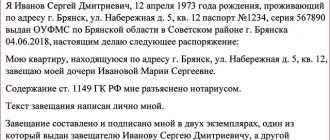A will is an official document that states the testator's last wishes regarding his or her property. The will comes into force only after the opening of the inheritance case (the death of the testator).
According to the law, the testator in the will has the right to independently determine to whom and in what shares the property will be transferred after his death. Often, after the opening of an inheritance case and the publication of a will, relatives express their disagreement with the will of the author of the document. This may be a reason to challenge the will. In addition, the act may be declared invalid in case of violation of the norms established by civil law.
Whatever the reason, a will is contested in court. It is recommended to seek the help of a lawyer. You can get a free consultation with a specialist in inheritance matters in our company. Call the phone number provided or write to us in the special window.
Challenging a will under the law
Issues of challenging a will are regulated in Art. 1131 Civil Code of the Russian Federation. In accordance with this normative act, in case of violation of the provisions of the law, a will may be declared invalid by a court decision or regardless of such a decision.
To challenge a will, the interested party must file a lawsuit in court after the opening of the probate case. There needs to be a good reason for this.
The basis for a challenge cannot be a clerical error or any minor violation of the procedure for drawing up, signing or certifying a document. It is important that the will of the testator is not understood ambiguously.
The law allows challenging not the entire will, but only part of it or individual orders. Invalidation of a specific order does not invalidate the entire document from the point of view of legislation.
The power of a will and who can challenge it
For the will to enter into legal force, it is necessary to submit an application to a notary to open an inheritance case. After this, the text of the document is read out, and the heirs are notified of the testator’s last will. The act is valid until the contrary is established.
The list of those who can challenge a will for inheritance is established in Art. 1131 Civil Code of the Russian Federation. Such persons include those whose property rights were infringed as a result of writing a declaration of will. In other words, an outsider will not be able to file a lawsuit (for example, concerned neighbors).
Typically, claims to challenge the testator's last will are filed by close relatives or spouses - those who could claim to receive property in the absence of a will. The vast majority of such legal proceedings are initiated by first-degree heirs.
Let's give an example. A man has died who, during his lifetime, made a will in favor of his partner. According to his will, she received an apartment and a dacha. The testator's daughter, when inheriting by law, would be the only heir of the first stage. She has the right to apply to the court to annul the will, since she is interested in this. But, let’s say, her maternal aunt will not be able to file a claim, since her property rights were not violated in any way.
Often, a claim is filed in court by the spouses of the testator in cases where he bequeathed property without the consent of the husband/wife. The fact is that citizens do not take into account the fact that everything that is acquired during marriage through paid transactions is the joint property of the spouses and is divided in half. In simple terms, the husband cannot bequeath the entire apartment to anyone, since by law he only owns 50% of this property.
When going to court, it will be necessary to prove that in the absence of a will, the plaintiff would have the right to receive the inheritance. Documents used as evidence are a birth certificate, a certificate from the registry office, a marriage certificate, etc.
Whose rights to inheritance are unconditional
Uncontested rights to the property of a deceased person, that is, unconditional, are possessed by incapacitated, disabled heirs who are dependent on the testator. They have the right to a certain piece of the bequeathed “pie” under any circumstances.
This category includes:
- parents or spouses who are on old-age or disability pensions;
- children recognized as disabled, minors;
- relatives who are dependent on a person during his life for at least one year.
It doesn’t matter who belongs to the category of compulsory heirs, he can claim 50% of the share that would have been given to him by law if there had been no will at all.
Is it permissible to challenge a will before the opening of the inheritance?
According to the law, challenging a will before the opening of the inheritance is not allowed. The opening of the inheritance occurs after his death or recognition as missing in court. This is explained by the need to maintain the secrecy of the will.
The testator is not obliged to notify other persons about what he wrote in the document and what his will is regarding the property. He can do this at will, but he has no obligation to notify the heirs.
After the death of the testator, the will can be issued to the heirs, whose names are indicated in the text of the document. A testamentary act is granted only on the basis of presentation of a certificate of death of the testator.
Everyone who participated in its execution is required to keep the secret of the will:
- witnesses;
- notary;
- translator;
- a person who has the right to sign the act instead of the testator for objective reasons;
- executor;
- the person certifying the will instead of a notary (for example, the captain of a ship, the chief physician of a medical institution, the commander of a military unit, etc.).
Administrative liability is provided for failure to maintain the secrecy of a will.
Accordingly, since no one knows about the contents of the document, challenging it before the opening of the inheritance case is impossible.
Judicial practice: whose side do the courts take?
Judicial practice is quite varied, as are the situations due to which wills are contested. Wills are contested quite often, especially in families where there are children from different marriages or where relatives are not particularly friendly with each other. Although, as practice shows, the division of inheritance can cause even the closest people to quarrel among themselves. According to Anastasia Gurina, the main motive for challenging a will is that the potential heir is dissatisfied with the will of the deceased. The courts take the side of the heirs if there have actually been serious violations of the form and procedure for certifying the will, the lawyer notes.
The legislation also provides for such a category as “unworthy heirs,” whose deliberate unlawful actions are directed against the testator, one of the heirs, or against the implementation of the testator’s last will. After an offense (and sometimes a crime) has been established in court, a notary, on the basis of a court decision, removes the unworthy heir from inheritance (both by will and by law), explains Maria Spiridonova.
An analysis of judicial practice shows that most often heirs go to court:
- on the invalidation of wills on the grounds of incapacity of testators who do not understand the meaning of their actions, or if the will is a forgery or if it was written by a person who does not understand what he is signing;
- the spouses of the testator, if the spouse bequeathed a part of the property that legally belongs to them, but without their consent;
- actual owners of real estate whose property was illegally inherited, although it did not belong to the testator by right of ownership;
- relatives whose relationship with the testator was confirmed after his death;
- if the spouses lived together for more than three years after the divorce, the remaining spouse makes claims to half of the property, challenging the will executed in favor of third parties.
“Courts evaluate the evidence available in the case, order examinations (handwriting, psychiatric, etc.), interview witnesses - and make a decision based on the information received. As a rule, the courts highly value and respect the last will of the deceased and only if there is strong evidence, make a decision to satisfy the demands of the heirs,” says lawyer Alisa Borisova.
Reasons for challenging a will
The grounds for challenging a will after the death of the testator may be general or special. Common reasons include the following:
- the testator could not be aware of the actions being performed due to the presence of a psychological disorder;
- the testator suffered from senile dementia;
- the will was drawn up while under the influence of alcohol or drugs;
- the text of the document does not correspond to the actual will of the testator;
- the document was formatted inappropriately.
Special grounds for challenge include:
- making a will under pressure or threats;
- drawing up a document with gross errors (for example, there is no signature of the testator);
- the document was drawn up by a group of persons, and not just the owner of the property;
- the authorized person did not have the right to certify the testamentary act;
- the signature was forged and this fact was proven;
- the heir specified in the will is declared unworthy by a court decision.
Proving the existence of these circumstances is often difficult. A medical examination and witness testimony may be required. A competent lawyer will prepare an evidence base and do everything possible to win the case.
Please note that minor clerical errors, typos and errors in design cannot become a reason for challenging and invalidating a will.
If there is intestate property
The same person, after his death, can leave property, one part of which is bequeathed to someone, and the second is not included in the estate.
In the first part, the heirs are the persons indicated in it. They may not have a family relationship with the deceased, be individuals or legal entities, representatives of organizations, commercial and non-profit associations.
Challenging a will by persons who do not agree with it is carried out exclusively in the manner established by the law of the Russian Federation, in the presence of special circumstances.
If the deceased did not leave a posthumous order, then all property is divided between relatives, according to the law:
- The first applicants are the closest relatives - these are official spouses, parents or adoptive parents, children.
- Beneficiaries of the second stage are blood brothers and sisters of the deceased, along with their own grandparents.
- Third on the list are the uncles and aunts of the deceased.
- The fourth position is occupied by great-grandparents.
- The fifth circle is cousins, grandparents.
- In sixth place are great-great-grandparents, great-grandparents, aunts and uncles, and nephews.
- The seventh level is occupied by stepmothers, stepfathers and stepchildren.
- In eighth place are disabled dependents who are distant relatives.
Intestate property is divided between people, according to current legislation.
If one of the legal heirs did not want to enter into rights and did not want to indicate in whose favor he was giving up, then this part of the property is divided among the remaining heirs of the same line.
In case of refusal or absence of all those on the waiting list of the first level, the rights are transferred to the beneficiaries of the second level and so on until the end. If there are no successors or all relatives refuse the inherited property, all of it goes to the state and is called escheat.
How to challenge a will
Disputes regarding the validity of a will are heard in court. The challenge process follows the following algorithm:
- Determining the basis for the challenge.
- Collection and preparation of evidence that will confirm the existence of grounds for challenging.
- Drawing up a statement of claim. Determining the judicial authority where the claim should be filed.
- Payment of the state fee for going to court. Details can be found in the office or on the website of the judicial authority.
- Filing a claim.
- Taking part in court hearings.
- Entry of the decision into legal force.
If the decision is made in your favor, after it enters into legal force, you must obtain a certificate of accession to inheritance rights. If you do not agree with the decision in the case, you can challenge it in a higher court.
It is worth trying to resolve the issue with the heir under the will peacefully. Perhaps you will be able to negotiate and come to a compromise. In this case, an agreement is drawn up and certified by a notary.
An heir who has received property illegally may try to dispose of it. For example, sell. To ensure the safety of the inheritance, it is necessary to send a corresponding application to the court. In such a situation, the court imposes an arrest until all circumstances are clarified.
After the will is revoked, in most cases, the persons named in the document will be able to participate in the distribution of the inheritance by law or on the basis of another will recognized as valid.
Consequences of canceling a will in court
If the court decides to satisfy the plaintiff’s demands and annuls the unilateral transaction, then the material belongings of the deceased are divided between relatives in a legal way. The cancellation does not deprive the citizens indicated in the certified document of the opportunity to participate in the division of property according to the law. For example, when the son of the deceased appears in a canceled inheritance transaction, this does not mean that upon re-division the person will not receive part of his father’s property.
If an original copy of the document is found, then it comes into legal force. Inheritance by law is abolished. When a subsequent unilateral agreement drawn up by the deceased is declared invalid, the property is divided in accordance with the legal norms of the Russian Federation. The reasons for canceling an action do not matter.
Claim to contest a will
Cases of challenging a will are heard by courts of general jurisdiction. The claim must be filed at the place of residence of the defendant. In cases where the claims relate to real estate, the case is considered at the location of such property.
The claim is drawn up according to the requirements set out in Art. 131 Code of Civil Procedure of the Russian Federation. The text must include:
- identification data of the plaintiff and defendant - full name, residential address, contact information;
- identification data of the testator;
- essence of the dispute;
- grounds for invalidating a will;
- the cost of the claim (the estimated value of the disputed property);
- claim to court;
- list of attached documents;
- date and signature of the plaintiff.
It is important to correctly draw up a statement of claim, since otherwise the court may refuse to open proceedings. It is advisable to contact a lawyer for assistance in registration. Correctly drafting a claim will increase the chances of winning the case.
There is no established list of documents for filing a claim. Papers are prepared depending on the situation. The list includes:
- general passport;
- death certificate of the testator;
- documents confirming the degree of relationship with the testator (they also serve as the basis for going to court) - birth certificate, marriage certificate, certificate from the registry office;
- witness statements;
- letters and correspondence of the testator with other persons, if they are relevant to the case;
- documents from medical institutions;
- results of the examinations carried out;
- other papers.
If necessary, you can request the necessary documents through the court. For example, a judicial authority can make a request to Rosreestr to find out what property is owned by the testator.
How to challenge an inheritance without a will
To challenge an inheritance without a will, you will need to go to court. This is the only way to establish the legality of inheritance. For this to happen, you need to follow the algorithm:
- Compliance with deadlines for filing a claim.
- Preparation of documents confirming the existence of grounds for challenging the inheritance.
- Filing a claim in court.
- Taking part in the trial.
- Obtaining a court decision.
- Contacting a notary office to cancel a previously issued certificate of accession to inheritance rights (if the court decision is positive).
It is important to consider the statute of limitations for all inheritance cases. As a general rule, it is three years, but in some cases this period may increase or decrease. It all depends on the grounds for challenging the inheritance in court.
The limitation period begins on the day the inheritance case is opened. However, in some situations, the heir learns that his rights have been violated much later. Then the period will be counted from the moment he is informed about it. For example, this can happen if the heir is outside the country and for some reason it is impossible to contact him.
Regardless of the grounds for filing a claim, it is necessary to adhere to the legal standards adopted by law. In accordance with Art. 131 of the Code of Civil Procedure of the Russian Federation, the claim must contain the following information:
- name of the judicial authority to which the application is submitted;
- details of the plaintiff and defendant;
- a description of the circumstances under which the plaintiff’s rights were violated;
- evidence of circumstances;
- claim;
- the cost of the claim, if the valuation is required by law;
- list of attached documents;
- date of filing the claim;
- plaintiff's signature.
The claim is filed at the place of residence of the defendant or at the location of the real estate about which the dispute is initiated. However, if the matter concerns issues of actual inheritance or establishment of other legal facts, it is necessary to apply at the place of residence of the plaintiff.
Time limits for challenging a will
The statute of limitations for challenging a will is the time period during which a person whose rights have been violated has the right to go to court to obtain protection. The statute of limitations will depend on the basis for the challenge. This is provided for in Art. 181 Civil Code of the Russian Federation.
Thus, you can file a lawsuit and challenge a will within the following time:
- three years if the requirements relate to the application of the consequences of the invalidity of a void transaction and its recognition as invalid;
- one year upon request to recognize a voidable transaction as invalid, as well as to apply its invalidity.
The calculation of the period begins from the moment when the interested person learned about the violation of his rights and interests.
Is it possible to challenge inheritance?
It does not matter under what order of inheritance the dispute is carried out. The procedure always follows the following principles:
- The notary does not have the authority to resolve disputes. Only the court deals with annulment.
- To confirm your position, you will need to provide evidence and necessary documents.
- Cancellation is only possible on legal grounds.
- Initiation of a case is permissible only by interested parties, that is, legal heirs.
- After a positive decision is made in the case, the property is distributed among all heirs whose rights are not disputed.
Cancellation is carried out upon entry into inheritance rights under a will. If the document loses legal force, the property is distributed among the legal heirs.
An analogue of annulment upon entry into inheritance under the law will be the recognition of the heir as unworthy. If there are several heirs, a separate procedure is carried out for each of them. When the heirs of the first priority are deprived of their rights, the opportunity to receive property arises for the representatives of subsequent priority.
Special cases
Most often, wills drawn up outside a notary's office are included in the category of contested documents. It is common practice for a will to be contested following the death of a person in a medical facility, in emergency circumstances, or one made during other periods of being away from home. Especially if the names of strangers appear in such an administrative act.
But to find out whether the will is contested in your case and whether it is worth taking on lawyers, it is better to consult initially. After all, the main conditions for the validity of a will are its timely and correct preparation. The law states that a person is free to independently dispose of his property, and after death, determine who will do it next.
When inheritance by will occurs, the conditions for the validity of the will include legal capacity, the absence of external influence on the will of the person, the taken into account shares of those to whom they should pass, a clearly drawn up and signed document. It should be remembered that the notary is obliged to explain these concepts and the conditions for the validity of the will.
However, to find out whether the will is disputed by the heirs, a person will not need to look for anything - he will be summoned to court as a defendant or witness in the case.
Gift deed or will: what cannot be challenged
According to the law, both a deed of gift and a will can be challenged. This right is ensured in civil legislation. However, in reality, achieving such a court decision is equally difficult. The interested party will need to provide irrefutable evidence that their rights were infringed and that the current heirs took possession of the property or the right to receive it illegally.
The deed of gift may be canceled in the following cases:
- the donee made an attempt on the life of the donor or members of his family, inflicted physical injury on any of them;
- the donee killed the donor - in this case, the relatives of the donor will be able to cancel the gift agreement in court;
- the new owner treated the received property carelessly, while for the donor it was of particular intangible value;
- the organization or individual entrepreneur issued a deed of gift within six months before the official declaration of bankruptcy;
- at the time of registration of the deed of gift, the owner of the property was under the influence of alcohol or drugs, was ill, was experiencing serious psychological trauma, or could not be held accountable for his actions for other reasons.
If we talk about a will, then the reasons for declaring it invalid lie in the condition and actions (inactions) of the testator. Such reasons may arise when, during the execution and signing of a will, the owner disposing of his property:
- was in a limited capacity by a court decision or due to not reaching the age of majority and signed the transfer of inheritance without the consent of legal representatives (guardians or parents);
- was subjected to physical violence and threats;
- could not control his actions and did not realize what exactly was happening;
- was mistaken regarding the circumstances that played a decisive role in his expression of will;
- expressed illegal and immoral provisions in the document;
- was not present when the will was drawn up and signed;
- called for the signing of the document by witnesses whose characteristics are considered unsuitable as a matter of law.
Many citizens confuse a will and a deed of gift, but from a legal point of view, these documents are completely different. First of all, the difference lies in the fact that the recipient always knows about the gift, since in the text of the deed of gift he expresses his consent to accept the gift. When drawing up a will, the testator is not obliged to inform the heir of his decision. Most often, he learns about the transfer of property only after the opening of an inheritance case - that is, after the death of the testator.
The second difference is that a will can only be challenged after the death of the testator. If we talk about the deed of gift, it is disputed at any time.
What is more difficult to challenge – a will or a deed of gift? Speaking from the point of view of jurisprudence, there are more grounds for recognizing a will as invalid than for recognizing a gift as such. In addition to general civil norms, wills are additionally subject to special norms of Chapter 62 of the Civil Code of the Russian Federation.
The grounds for invalidating a gift agreement are only general civil ones, as well as those provided for in Chapter 32 of the Civil Code of the Russian Federation. In addition, if the property becomes the property of the gift recipient, it cannot be included in the donor's estate.
However, heirs may doubt the validity of the deed of gift and file a lawsuit to challenge the transaction and include the property in the estate. But, if we consider judicial practice in such cases, it is extremely difficult to achieve satisfaction of the claim.
Whatever the reason, it is almost impossible to invalidate a deed of gift or will without the support of an experienced lawyer. You can consult with inheritance lawyers about the prospects of your case. To do this, call the indicated phone numbers or write to us.
Challenging a will by first-degree heirs
The heirs, whom the legislator classifies as first priority, have the greatest interest in challenging the inheritance if the testator has decided to dispose of the property not in their favor. First priority heirs include the testator's mother, father, husband, wife or children. They would definitely have received ownership of the property if it were not for the will, so they have the right to go to court.
When there are no heirs of the first stage, the most interested persons are those who belong to the second stage. If there are none, the will may be challenged by subsequent heirs. This is in theory. In practice, a challenge can be initiated by any person who has conclusive evidence of their right to inheritance.
In addition, the law defines persons who cannot be deprived of the right to receive an inheritance even if they were not mentioned in the will. Such persons include:
- Dependents of the testator, even if they are not his relatives (for example, a spouse who has lost the ability to work), as well as relatives by blood (grandmother, parents, grandfather, etc.).
- Disabled adult children (including adopted children).
- Children under the age of majority.
It is important to take into account that if at the time of opening the inheritance case the husband and wife were divorced, the surviving spouse will not have the right to a share in the inheritance. This same category of persons includes cohabitants or, as they are commonly called, “common-law husband or wife,” since the legislation of the Russian Federation recognizes only official marriage registered in the registry office.
Relatives can file a claim and challenge the will in the following situations:
- they suspect that the testator was subjected to moral or physical pressure when formalizing his will regarding the property;
- the testator was declared legally incompetent during his lifetime;
- the will was drawn up under the influence of external factors;
- the document was drawn up under dictation by a third party;
- the legal form of the will was violated or the document was incorrectly certified by a notary.
First priority heirs can challenge the will even after it comes into force. In this case, a statement of claim is filed, which explains why the plaintiff believes that his rights have been violated. The claim must be supported by documentary evidence. For example, if the testator was incapacitated, a medical certificate will be required.
It is best if a competent lawyer who has already participated in similar cases more than once and has practical experience in resolving such issues is present at the meetings. The lawyer will study the circumstances and draw up theses for use in court. If necessary, the expert will prepare an evidence base and make requests to the necessary institutions to obtain documents, and will also attract witnesses.
Cost of challenging a will
An extremely important point when contesting a will concerns the cost of the procedure. To determine how much it will cost to go to court, it is necessary to rely on the provisions of Art. 333.19 Tax Code of the Russian Federation.
In accordance with the provisions of this regulatory act, the following amounts of state duty apply:
- the amount of property is not more than 20,000 rubles - the state duty is equal to 4% of the value, but not less than 400 rubles;
- the amount of property is from 20,000 to 100,000 rubles - the state duty will be 800 rubles and 3% of the amount exceeding 20,000 rubles;
- the amount of property is from 100,000 to 200,000 rubles - the state duty is 3,200 rubles and 2% of the amount exceeding 100,000 rubles;
- the amount of property is from 200,000 to 1 million rubles - the state duty is 5,200 rubles and 1% of the amount over 200,000 rubles;
- the amount of property is more than 1 million rubles - the state duty is 13,200 rubles and 0.5% of the amount above 1 million rubles, but the amount of payment cannot be higher than 60,000 rubles.
The amount of the claim is indicated by the plaintiff in the statement of claim. It is determined as a result of appraisal work by an independent appraiser.
If the amount does not correspond to the real one, the court has the right to make the necessary adjustments. This figure should not be deliberately overestimated or underestimated.
Additionally, you will need to pay for legal services. Here prices vary depending on the region.
| Services of lawyers and advocates | Price |
| Initial free consultation (up to 30 minutes) | FOR FREE |
| Consultation in writing | from 2000 rub |
| Drawing up an application for a court order | from 1000 rub |
| Drawing up the necessary documents: claims, complaints, requests | from 3000 rub |
| Representation in court | from 5000 rub |
| Turnkey legal protection: from claim to victory | from 15,000 rub. |
| Appeal, defense in a higher authority | from 3000 rub |
| Assistance in the execution of a court decision | from 3000 rub |
Customer Reviews
Gratitude from Ivanov I express my gratitude to Vasily Anatolyevich for the correct and competent legal assistance in solving my case. I wish you and your entire company prosperity and success.
With all my heart, V.V. Ivanov. 05/10/2018
Gratitude from N.A. Tomashpolskaya I would like to express my deep gratitude to Alexander Viktorovich Pavlyuchenko for his competent legal advice and sensitive, attentive attitude towards me, who found myself in a difficult situation.
Sincerely, Tomashpolskaya N.A. 07/01/18
Gratitude from Kikkas V.P. Kikkas V.P. I am grateful to the Legal Agency of St. Petersburg for understanding the situation and timely assistance in my seemingly hopeless situation, personally to Denis Yuryevich Stepanov, I hope to continue to cooperate.
Kikkas V.P. 08.11.2018
Gratitude from D.V. Ezhov, General Director of the SKA-Strelna hockey school The management of the SP-Strelna hockey school thanks the team of the Legal Agency of St. Petersburg for many years of fruitful cooperation and support of Russian children's hockey, dedication and professional approach.
We sincerely wish the employees of the Legal Agency of St. Petersburg great victories, professional success and inexhaustible vital energy!
Review by Minina M.V. I would like to express my deep gratitude to Yuri Vladimirovich Sukhovarov for his competent advice and qualified assistance on my issue.
With gratitude, Minina Margarita Vladimirovna.
Gratitude from Volkova N.E. I express my gratitude to Vasily Anatolyevich for his professional and competent assistance in resolving the issue of protecting my consumer rights. As a result, I received decent compensation from. Thank you!
Volkova N.E. November 30, 2018
Gratitude from Tunnova L. Sergey Vyacheslavovich! Thank you for the qualified advice you provided regarding my question in the field of consumer protection (dispute with TC OPT, the kitchen was not delivered)
Lyubov Tunnova December 12, 2018
Review by Lurie L.D. I, Lurie L.D., want to express my gratitude and gratitude for the competent advice and cordial attitude towards me as a client.
Gratitude from Matvey Fomin I, Matvey Alekseevich Fomin, am grateful to Vasily Anatolyevich Kavalyauskas for the timely legal advice and prompt assistance in resolving my issue. Calm and decisive. Thank you.
Fomin M.A.
Gratitude to Kavalyauskas V.A. from Astafieva A.S. I express my gratitude to the Legal Agency and in particular to lawyer Vasily Anatolyevich Kavaliauskas for the skillfully done work. Vasily Anatolyevich advised and prepared all the documents necessary for court proceedings. As a result of the consideration of the consumer rights case, the result and the high amount exceeded all my expectations. Thank you very much for your qualified work and professionalism.
Sincerely, Astafieva A.S., 03/01/2019








